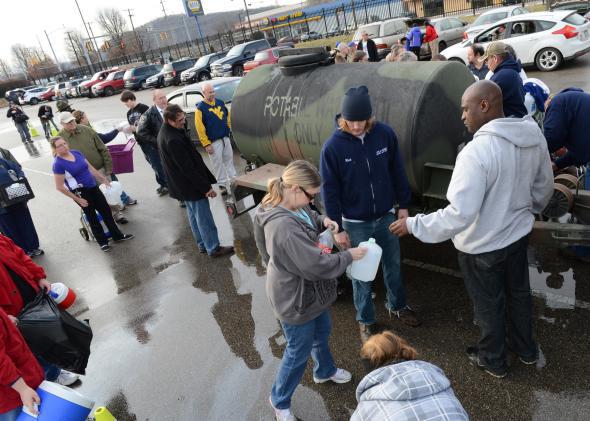As frustration grows among the 300,000 West Virginians who have endured days—and will likely have to endure several more days—without clean tap water, it remains unclear why authorities and the water company appear to have been so utterly unprepared for Thursday’s spill. Authorities, at least, were well aware the company that spilled the pollutant into the water supply had been storing industrial chemicals at the site, reports the Wall Street Journal. Documents show that Freedom Industries submitted all the appropriate paperwork in February outlining that it was storing at least 100,000 and as much as 999,999 pounds of the chemical 4-methylcyclohexane methanol, or MCMH. Around 7,500 gallons of that chemical spilled into the river and a nearby water treatment plant on Thursday.
It’s unclear whether the West Virginia American Water Co. was aware the chemical was being stored there but the company did acknowledge it was unprepared for MCHM with a spokeswoman saying that “this was not a chemical we were familiar with.” They were hardly alone. Public agencies and officials are “all acting a bit surprised that this mystery substance was being stockpiled so close to a crucial water intake, and shocked that something like this could have happened,” notes the Charleston Gazette.
Why officials appeared to be so unprepared for the spill will take center stage at the federal investigation that has already been launched. For now, it remains unclear how long it will be until residents get clean tap water again. Before that can happen, samples must consistently show the presence of the chemical is at or below 1 part per million over a 24-hour period, notes the Associated Press. Once that milestone is reached, the water company can begin testing the water across the region and begin flushing the system. So far, only a few have been hospitalized, although emergency rooms are full of concerned people. Doctors worry that the crisis could lead flu to spread more quickly because a lack of clean water means that people aren’t washing their hands, notes CNN. On Sunday, the University of Charleston said it is closing down its main campus until further notice because of a lack of clean water.
